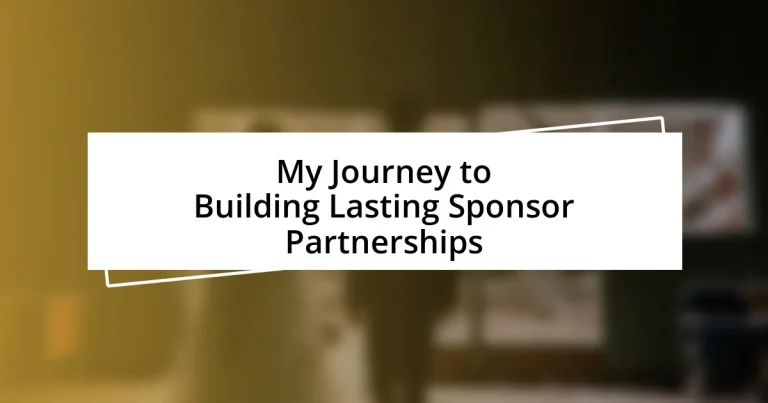Key takeaways:
- Clear communication and alignment of values are essential in building lasting sponsor partnerships.
- Creating tailored value for sponsors enhances brand visibility and deepens the connection.
- Regular feedback and openness foster trust and allow for continuous improvement in collaborations.
- Adaptability in response to challenges, such as shifting to virtual engagements, is crucial for sustaining long-term partnerships.
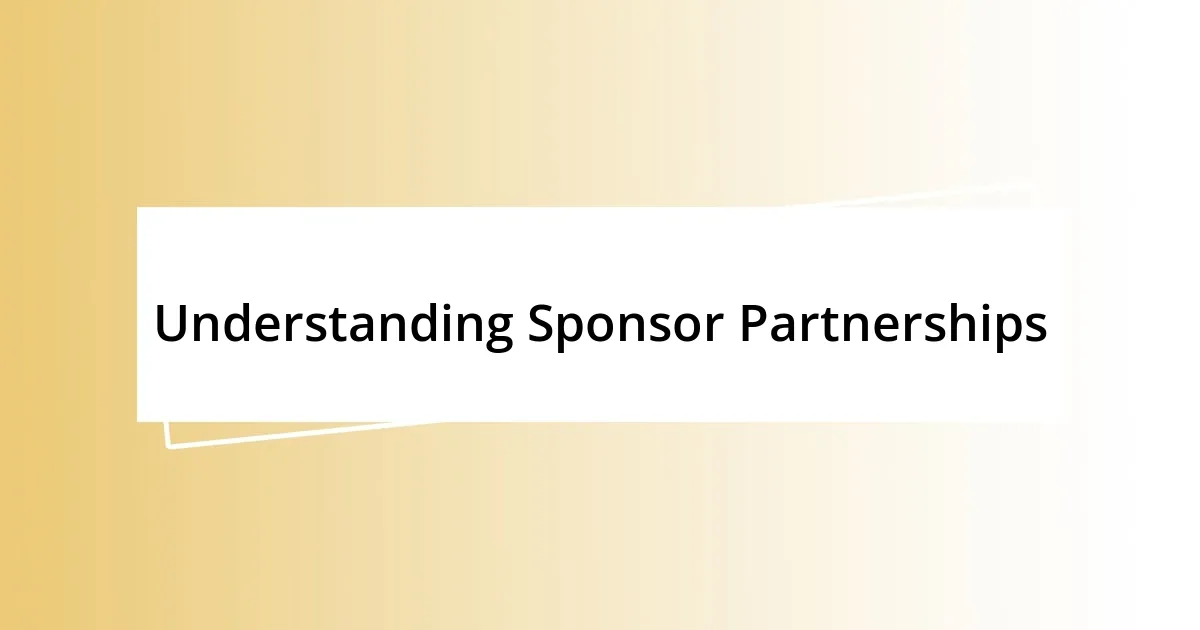
Understanding Sponsor Partnerships
Sponsor partnerships create a unique synergy where both parties can achieve their goals. From my experience, it’s like a dance; each partner must understand the other’s moves to create a harmonious outcome. Have you ever felt the thrill of collaboration? It’s invigorating when everyone is working towards a common vision.
When I first embarked on my journey to secure sponsors, I realized that clear communication was key. I remember sitting at a café with a potential sponsor, laying out what we both wanted to achieve. We both left that meeting feeling energized and aligned—like we had just designed a blueprint for success.
Building lasting sponsor partnerships is not just about numbers; it’s about connection. I recall a time when I felt disheartened after a rejection. But then I reflected on the relationships I’d built and the authenticity I had shown along the way. Isn’t it remarkable how vulnerability can lead to stronger ties? Ultimately, trust and shared values are what transform a simple sponsorship into a powerful alliance.

Identifying Your Target Sponsors
Identifying target sponsors is a crucial first step in building fruitful partnerships. In my experience, it’s not just about chasing any sponsor; it’s about pinpointing those whose values align with your mission. I remember a project I was passionate about. Instead of going after big brands, I focused on local businesses whose missions resonated with my own. That decision led to not only support but also a sense of community engagement that enriched the project.
When considering potential sponsors, think about their audience and goals, too. I learned this the hard way—once, I pitched to a company that had no interest in my demographic. It felt like a misstep, but it taught me the importance of researching their marketing objectives. Understanding what they are aiming for can turn a one-off deal into a long-lasting relationship. What are their campaigns saying? What kind of events do they prioritize? These questions will lead you to a more meaningful connection with potential sponsors.
A great way to evaluate sponsors is to compare their values with your own. Use a table to visualize the alignment, and it can make the decision-making process less overwhelming. After all, partnerships blossom when both sides have something to gain. Reflecting on my journey, the sponsors who truly understood my vision have always been the most fulfilling partnerships.
| Your Values | Potential Sponsors’ Values |
|---|---|
| Community Engagement | Local Businesses |
| Innovation | Tech Companies |
| Wellness | Health Brands |
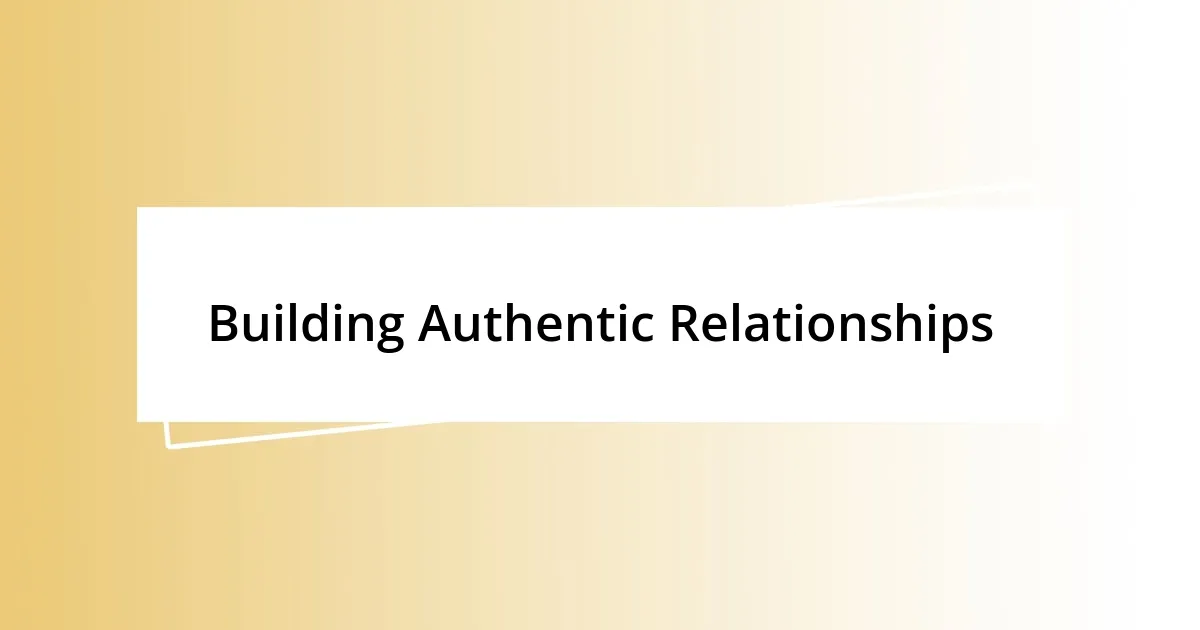
Building Authentic Relationships
Building authentic relationships with sponsors goes beyond simple transactions; it hinges on genuine connection. I remember a time after I attended an event where I met a sponsor who shared similar values. We quickly bonded over our mutual passion for social impact, and that shared enthusiasm turned a casual introduction into a meaningful dialogue. In my view, it’s in those moments of true connection where the foundations for long-lasting partnerships emerge.
Here are key elements to consider for nurturing these authentic relationships:
– Transparency: Always be honest about your goals and expectations.
– Active Listening: Show genuine interest in their stories and aspirations.
– Shared Experiences: Engage in activities together that reinforce the partnership.
– Consistent Communication: Keep the lines open—not just when you need something.
– Appreciation: Celebrate their contributions and acknowledge their effort.
These principles have served me well in building rapport that fosters loyalty and collaboration. I often think back to that sponsor and how our relationship flourished because we took the time to understand each other. Isn’t it fascinating how dedication to sincerity can shape the landscape of partnerships?
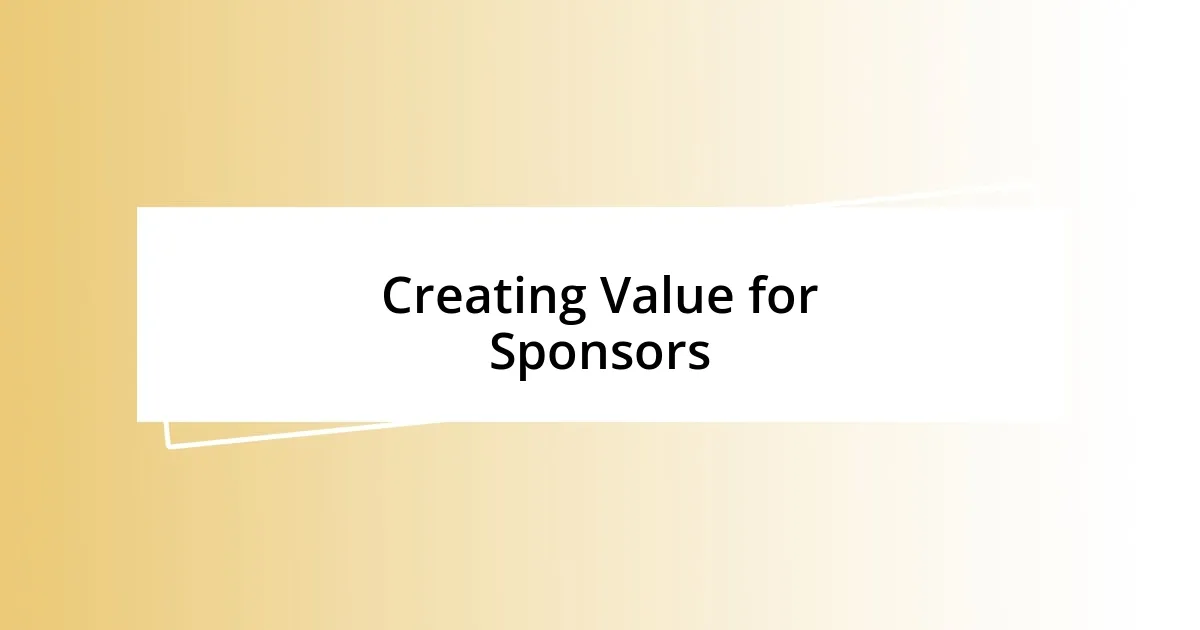
Creating Value for Sponsors
Creating value for sponsors is all about delivering what they need while enhancing their brand visibility. I recall a partnership where I presented a unique activation idea that not only showcased the sponsor’s products but also integrated them into an engaging experience for the audience. This pushed the limit beyond a mere logo placement; it transformed their product into a memorable part of the event, ultimately boosting their visibility and driving sales.
It’s crucial to tailor your offerings to fit sponsors’ objectives. Once, I collaborated with a sponsor who wanted to increase engagement on their social platforms. I developed a series of social media challenges that not only promoted their brand but encouraged our audience to participate. The result? A surge in user-generated content that brought them significant online buzz. Have you ever thought about how your creativity can solve a sponsor’s specific marketing challenge? Finding those intersections is where true value is created.
Measuring the impact of your partnership is another vital ingredient for success. After completing a project, I made it a point to provide detailed analytics that illustrated the outcomes. From increased foot traffic to heightened online engagement, those insights not only showed sponsors tangible results but also laid the groundwork for future collaborations. Isn’t it comforting to know that when you create value, you build bridges for lasting relationships?
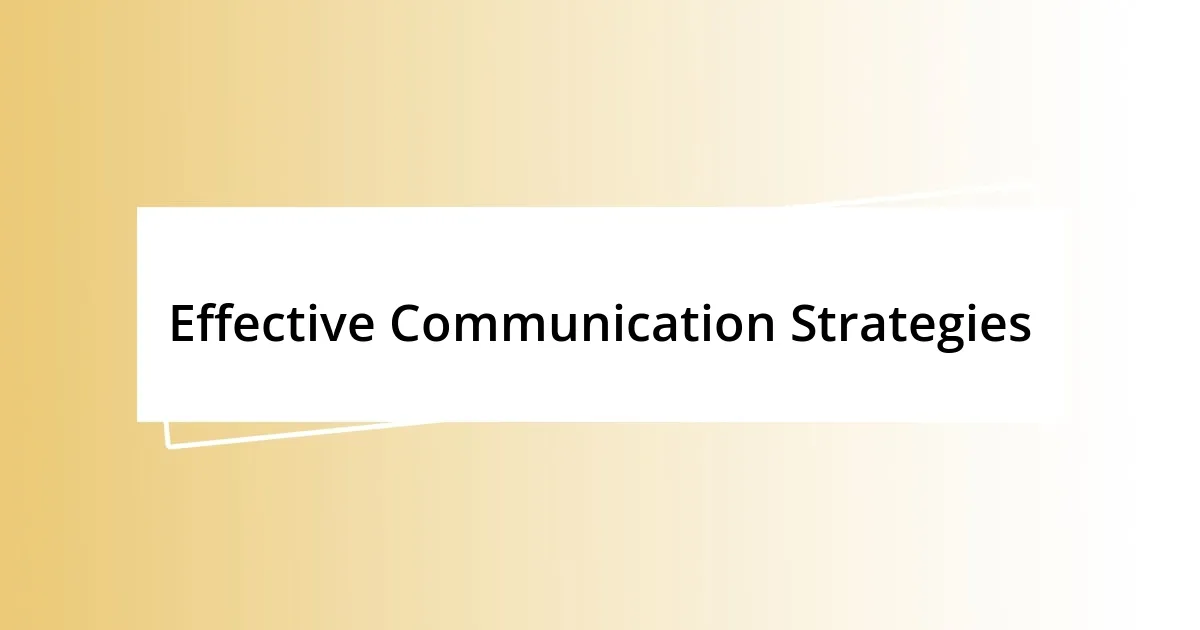
Effective Communication Strategies
Effective communication is at the heart of successful sponsor partnerships. One time, I reached out to a sponsor after an event to provide feedback on our collaboration. Instead of just stating the outcomes, I shared personal stories from attendees who were impacted by their support. This not only highlighted the success of our partnership but also made the sponsor feel like they were a part of something bigger. Have you ever shared personal stories with your partners? It can really deepen the connection.
Another strategy I’ve found is to schedule regular check-ins, even when there isn’t an immediate agenda. During these informal chats, we discuss our mutual goals and explore new opportunities. I remember one conversation that sparked an innovative campaign idea simply because we were open and curious about each other’s visions. It made me wonder: how often do you take the time to just connect without the pressure of business?
Lastly, adapting your communication style can make a significant difference. Some sponsors prefer straightforward emails, while others thrive on creative presentations. I once adjusted my approach for a sponsor who was more visual. I sent an infographic summarizing our progress, which they appreciated much more than a lengthy report. This experience taught me the importance of tailoring communication to meet the preferences of each sponsor. How about you? Have you considered how your communication style affects your partnerships?
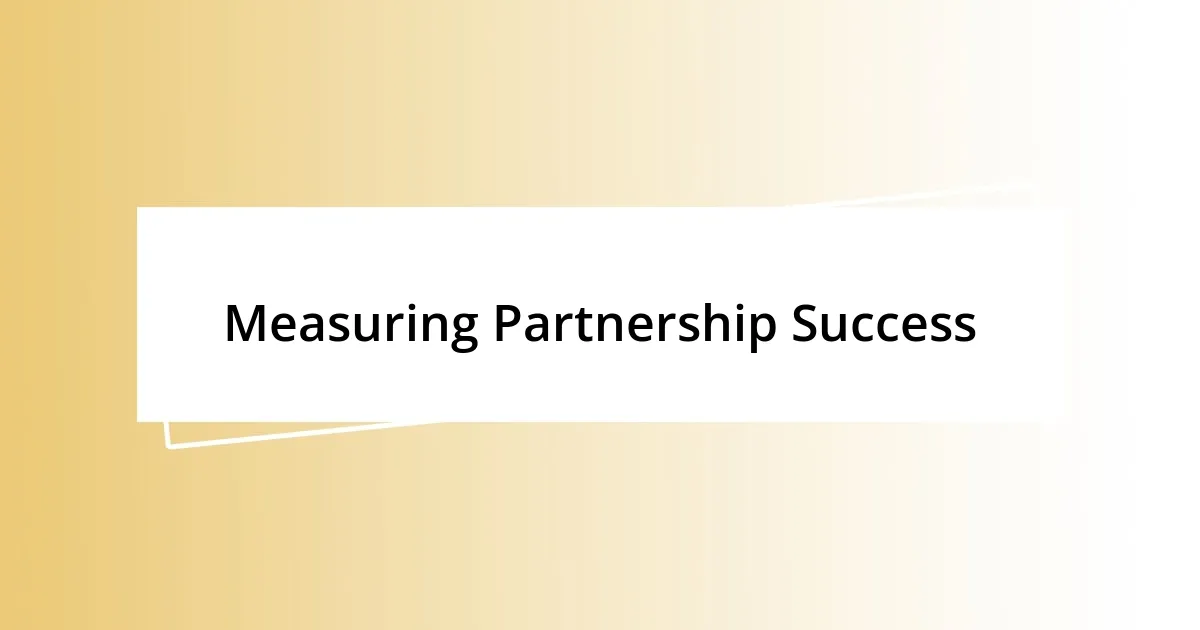
Measuring Partnership Success
Measuring partnership success goes beyond simply checking numbers. One memorable project involved a sponsor that wanted to assess its impact on local communities. We crafted surveys to gather feedback from attendees, and I was overwhelmed by the heartfelt testimonials we received. Hearing directly from those affected by our initiative gave the sponsor not just metrics, but human stories that truly illustrated their contribution. Have you had experiences where qualitative data painted a more vivid picture than statistics alone?
Another essential aspect is setting clear and achievable KPIs (Key Performance Indicators) from the outset. When I partnered with a brand for a community event, we aimed for specific goals, such as improving brand recall and increasing email sign-ups. Post-event, analyzing these indicators revealed some surprising insights, like a 30% uptick in brand awareness that we hadn’t anticipated. Reflecting on these statistics not only validated our efforts but also fueled excitement for future projects. How do you ensure that your goals align with your partners’ expectations?
Lastly, incorporating continuous feedback mechanisms has proven invaluable in my experience. After one particularly successful campaign, I conducted a debrief session with the sponsor, where we discussed not only what went right but what could be improved. It was during these open conversations that we discovered innovative ideas for future collaborations. I wonder, have you ever considered how regular feedback could transform a good partnership into a truly exceptional one?
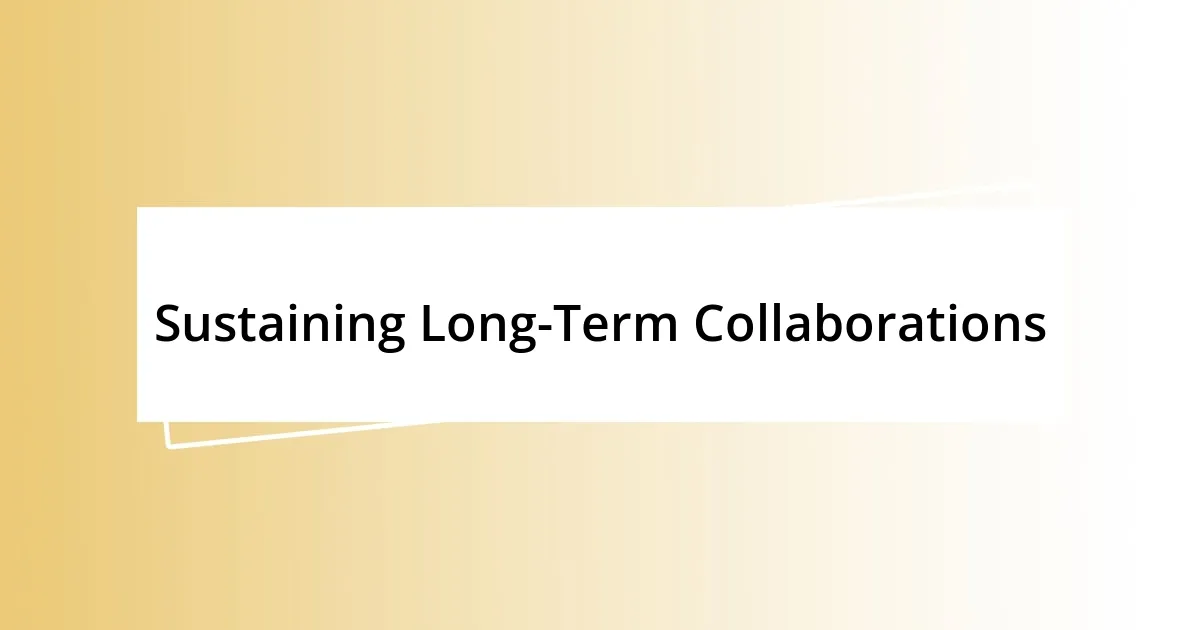
Sustaining Long-Term Collaborations
Sustaining long-term collaborations requires a genuine investment in the relationship. I recall a project where we celebrated milestones together with our sponsors. We organized a small appreciation event where sponsors were acknowledged publicly. It wasn’t just about recognizing their contributions; it created a sense of community and shared achievement. Have you ever thought about how those moments of gratitude can reinforce partnerships?
Building trust is another crucial element. In one partnership, I faced challenges with communication that threatened our collaboration. Instead of avoiding the issue, I opted for transparency and shared my concerns openly. This honesty fostered a deeper level of trust between us, leading to more constructive discussions in the future. Have you been in a situation where addressing a difficulty head-on strengthened your relationship?
Additionally, being adaptive to changing circumstances plays a vital role in sustaining partnerships. When the pandemic hit, our previously planned events fell through. Rather than giving up, we quickly pivoted to virtual offerings and included our sponsors in brainstorming sessions for new ideas. This flexibility not only kept our partnership alive but also ignited innovative strategies that shaped our future collaborations. How adaptable are you when unexpected challenges arise in your partnerships?












